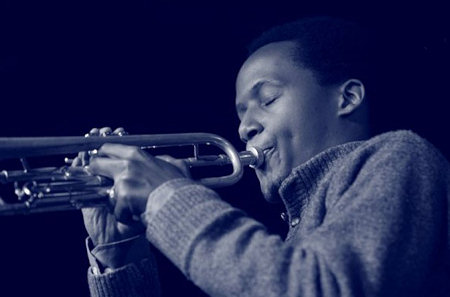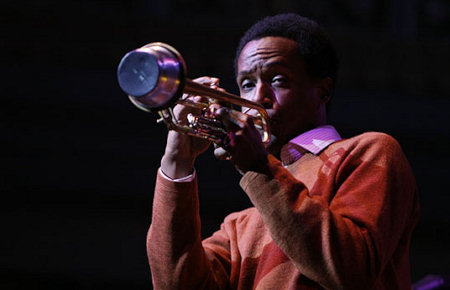|
Interview With Jason Palmer
September 2012
by Achille Brunazzi
|
 |

Jason Palmer represents one of the brightest and valuable emerging
American jazz trumpeters. In the next interview Palmer introduces himself from his
beginnings at school to his current role of teacher with very young students; he
also talks about his view of music and as bandleader.
Tell me about your first approach to music?
I grew up listening and dancing to music like many people. I also got into playing
music while I was a young student in North Carolina. I started on cornet then switched
to trumpet in high school.
Was there anyone in your family who was familiar with music?
Everyone in my family loves music. I'm the only trained musician. My father plays
guitar by ear but isn't a studied musician per se. He says that I got my ear for
music from him.
Why and how did you pick the trumpet?
After passing the ear-training test in the 5th grade I was
assigned to the trumpet for the following year. My mother bought me what turned
out to be a cornet and that's what I played for grades 6, 7, and 8.
Who was the most influential figure during your studies
at school and why?
I had many great mentors and I think it would be unfair
to say who was the most influential because all of them were instrumental to me
at a time when I needed them the most. The list of figures includes but not limited
to: Ronnie Ingle, Laura Francis, Kurt Gill, John McNeil,
Danilo Perez,
Darren Barrett, Jeremy Pelt, Bob Moses, Cecil Mcbee,
Jerry Bergonzi,
George Russell.
Where did you study music? Do you think that school can
teach all you need to be a great artist?
I was a student at the New England Conservatory of Music in Boston, but I've learned
about music and being an artist in many, many situations outside of school. I certainly
don't think that you can be taught ALL that you need to know to become a great artist
in school, but I do believe that in today's musical climate, schools do provide
a scene within themselves where serious young musicians meet each other and grow
together artistically. I think that this is essential especially in the United States,
considering the lack of support for the scene by the local and federal governments
and the dwindling number of places where young musicians can hone their craft. I
consider myself lucky because I was able to take advantage of the school scene as
well as the scene outside of it by performing on a regular basis at venues in Boston
such as the Wonderbar, the Good Life, and most importantly, Wally's. Performing
at Wally's Café every weekend for over a decade has given me many tools to work
with in this music. Performing in Greg Osby's band also gave me many perspectives
in this art form that I wouldn't be able to acquire in any school.
What's the most relevant lesson you learnt at school musically?
Everything that I learned in school is artistically relevant to what I have become
today. I wouldn't want to rank anything higher than the other because all of my
lessons found a way to nurture the other. Everything is intertwined such as the
universe!
You are now educator, what do you think the most important
thing to teach to your students is?
I think that my job as an educator is to assess where the students are artistically
and give them what I think may be missing from their arsenal of artistic assets.
No one thing is most important to me or hopefully them. Everything works together.
What do you want them really learn from you? Are you patient
as a teacher?
That's a broad question because I teach many subjects at the Berklee College of
Music. I'm an Ensemble director, Improvisation Techniques instructor, as well as
a Repertoire Teacher. In these classes I always try to instill the skills that they'll
need to have in order to be able to teach themselves when they are out of school
because learning within this music is a lifelong process. Those who know me personally
know that I'm a very patient person, so I think that being that way as a teacher
has always come naturally to me. My challenge as a teacher has always been to know
when to lay down stringent expectations when I feel that a student needs to be pushed
a little.
Did you ever play around gospel environments when you were
younger?
No.
Who was the first jazz record (or any other record) you
listened to?
John Coltrane's
A Love Supreme and Miles' My Funny Valentine + 4 and More.
Who were the trumpet players you admired more? Please quote
your music influence too.
I admire any trumpeter that plays with fire and integrity. Anyone from Pops
to Bill Dixon.
Do you think now jazz musicians are different compared
to the old generation and why?
I'm not in the mindset of comparing one generation with the next. That's one of
the big problems in this industry. If we're too consumed with focusing on the differences,
we'll never embrace each other to the point where we can learn from each other.
 Wynton
Marsalis founded a kind of " school " and discover lot of trumpet players; don't
you think their style – the phrasing and voice - is quite similar each other? I
mean in the 40's, 50's, 60's and 70's you could nearly immediately recognize a trumpeter's
voice; now it doesn't happen that much, please tell me why? Wynton
Marsalis founded a kind of " school " and discover lot of trumpet players; don't
you think their style – the phrasing and voice - is quite similar each other? I
mean in the 40's, 50's, 60's and 70's you could nearly immediately recognize a trumpeter's
voice; now it doesn't happen that much, please tell me why?
Some people may say that, but I don't believe in this way of thinking.
I've written about this on my blog (click)
How practice is important even for trumpet players like
you? Please quote what do you usually do at home? What kind of exercises you would
recommend to any beginners and advanced trumpet student?
Practice is VERY important for trumpeters, because the instrument is naturally unforgiving.
I practice as much as I can. I'm a student of the Carmine Caruso method.
I would advise novice players to find a teacher and develop healthy playing and
lifestyle habits, and for advanced players to maintain the same.
Some musicians like Booker Little, Woody Shaw were
not and still are not deservedly awarded, please tell me why and say something about
their legacy in music?
There are many reasons that great artists of their caliber never get they recognition
that they deserve, reasons that have been explained by many who can speak on this
topic more eloquently than me. But I will say this: The work that they left serves
us that are aspiring to be great in this art form a bar to strive for.
In particular what do you think about Woody Shaw? Why his
style was so "special"?
Woody Shaw was a great stylist on trumpet and there's nothing that I can
say about how great he is that hasn't been said before. He played things that others
hadn't thought of….
You became bandleader relatively young with " Songbook
" in 2008, could you " easily " propose your projects and have them published from
the label?
The owner of the label Avya Musica, which published my first album, approached me
about working together around 2005. I had been
leading a band playing every weekend at Wally's Café in Boston for at least five
years before they approached me.
As a bandleader, what do you ask your band members?
Do your best to be on time and come with an open mind and an open ear.
Some reviewers categorized you as a post-bop trumpeter;
does it describe your music at best?
No, but I guess they need to use that term for lack of a better one.
Tell me about your next project: " Here Today "
Here Today was released last year in September and it can be found everywhere online
and at a few select retail stores. Find out more about it on my website which can
be found at www.jasonpalmermusic.com
Insert an opinion
|
© 2000 - 2026 All the material published on Jazzitalia is exclusively owned by the author. Moreover it is protected by International Copyright, so it is forbidden any use of it which isn't authorised by the rights' owner.
|
This page has 1.280 hits
Last Modified Date: 11/11/2012

|
|

